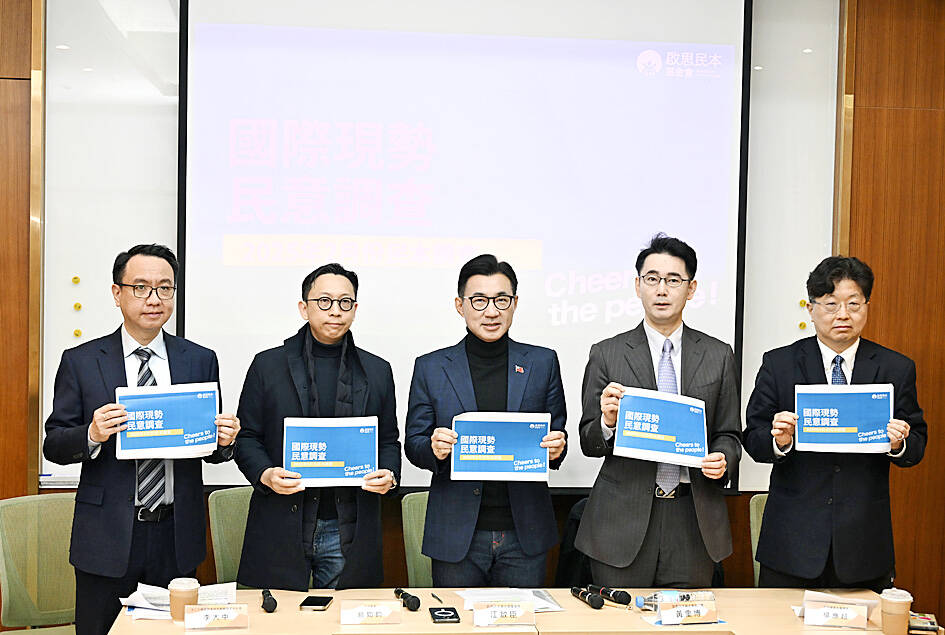More than 80 percent of Taiwanese opposed transferring Taiwan Semiconductor Manufacturing Co’s (TSMC) advanced technology to the US, a survey conducted by the Foundation for the People showed yesterday.
The foundation yesterday held a news conference to announce the results of its poll about the international situation, which was attended by the foundation’s chairman and Deputy Legislative Speaker Johnny Chiang (江啟臣).
The poll showed that 85.6 percent of Taiwanese believed US President Donald Trump’s administration could pressure Taiwan by imposing higher tariffs, while 52.8 percent of respondents said harsher US tariffs are “very likely” to happen and 10.7 percent said they are “unlikely” or “impossible.”

Photo: Lo Pei-de, Taipei Times
Asked whether current Taiwan-US trade is equal and fair, 40.6 percent of respondents said it is, and 49.0 percent said it is not. Additionally, 62.4 percent of respondents believed that the US has an advantage over Taiwan, while 24.8 percent saw it the other way around.
To lessen Taiwan’s trade surplus with the US, 59.5 percent of respondents said Taiwan should purchase arms and military systems, 41.6 percent picked fossil fuels and nuclear energy, 35.4 percent chose agricultural products, 12.5 percent went with cars and 11.5 percent picked computers and components, the results showed.
Up to 83.8 percent of respondents agreed that Taiwan’s semiconductor sector, led by TSMC, can be regarded as the “economic central mountain range” safeguarding the nation against Chinese military threats, while 8.8 percent disagreed.
As for whether Taiwan’s semiconductor industry serves as a “silicon shield” that would prompt military intervention from the US and other Western countries if China were to attack, 62.5 percent agreed and 30.8 percent disagreed.
Asked whether they agreed with Trump’s remark that Taiwan “stole” the US’ semiconductor businesses, 88.4 percent of respondents said they did not, while 9.5 percent said they did.
As for whether the Ministry of Economic Affairs should allow TSMC to transfer its advanced 2-nanometer process to the US if Trump makes more pressing demands, 84.8 percent said the ministry should not, while 10.9 percent said it should.
The poll also showed that 50 percent of respondents agreed that the governing Democratic Progressive Party had proactively negotiated with Washington to deal with Trump’s demands, while 42.6 percent disagreed.
As for the future of the US-China relationship, 13.4 percent of respondents said they believed it would get better, while 37.4 percent said the “status quo” would remain and 40 percent said it would worsen.
Chiang said that under Trump 2.0, talks would continue, with tariffs as a weapon.
Trump is testing countries to see what they would use as bargaining chips to trade with the US, he said.
In this “great negotiation era,” the government should establish its negotiation goals and strategies as soon as possible, Chiang said.
Taiwan should also develop other industries’ competitive edges instead of relying solely on TSMC, he said, adding that the semiconductor sector accounts for a huge portion of the nation’s GDP.
The survey was conducted by the foundation through the Internet, with respondents aged 20 or older nationwide. It collected 1,042 valid responses from Tuesday last week to Friday last week and has a margin of error of 3.03 percentage points.
The questionnaires were given to participants via Facebook advertisements, with raking ratio estimation used to ensure the sample is representative of the nation’s demographics in gender, age, region and educational background.

Taiwan is stepping up plans to create self-sufficient supply chains for combat drones and increase foreign orders from the US to counter China’s numerical superiority, a defense official said on Saturday. Commenting on condition of anonymity, the official said the nation’s armed forces are in agreement with US Admiral Samuel Paparo’s assessment that Taiwan’s military must be prepared to turn the nation’s waters into a “hellscape” for the Chinese People’s Liberation Army (PLA). Paparo, the commander of the US Indo-Pacific Command, reiterated the concept during a Congressional hearing in Washington on Wednesday. He first coined the term in a security conference last

Prosecutors today declined to say who was questioned regarding alleged forgery on petitions to recall Democratic Progressive Party (DPP) legislators, after Chinese-language media earlier reported that members of the Chinese Nationalist Party (KMT) Youth League were brought in for questioning. The Ministry of Justice Investigation Bureau confirmed that two people had been questioned, but did not disclose any further information about the ongoing investigation. KMT Youth League members Lee Hsiao-liang (李孝亮) and Liu Szu-yin (劉思吟) — who are leading the effort to recall DPP caucus chief executive Rosalia Wu (吳思瑤) and Legislator Wu Pei-yi (吳沛憶) — both posted on Facebook saying: “I

The Ministry of Economic Affairs has fined Taobao NT$1.2 million (US$36,912) for advertisements that exceed its approved business scope, requiring the Chinese e-commerce platform to make corrections in the first half of this year or its license may be revoked. Lawmakers have called for stricter enforcement of Chinese e-commerce platforms and measures to prevent China from laundering its goods through Taiwan in response to US President Donald Trump’s heavy tariffs on China. The Legislative Yuan’s Finance Committee met today to discuss policies to prevent China from dumping goods in Taiwan, inviting government agencies to report. Democratic Progressive Party Legislator Kuo Kuo-wen (郭國文) said

Sung Chien-liang (宋建樑), who led efforts to recall Democratic Progressive Party (DPP) Legislator Lee Kun-cheng (李坤城), was released on bail of NT$80,000 today amid outcry over his decision to wear a Nazi armband to questioning the night before. Sung arrived at the New Taipei District Prosecutors’ Office for questioning in a recall petition forgery case last night wearing a red armband bearing a swastika, carrying a copy of Adolf Hitler’s Mein Kampf and giving a Nazi salute. Sung left the building at 1:15am without the armband and covering the book with his coat. Lee said today that this is a serious